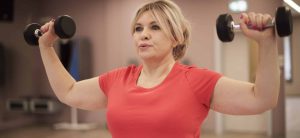To minimize menopause weight gain, increase activity levels and adopt healthy eating habits. Even if you are exercising vigorously, you cannot exercise away poor nutrition, and, contrary to popular belief, exercise alone does not cause significant weight loss.
If you keep eating the same way as always, and you donat add any more exercise, then chances are good that youall end up gaining weight. We also tend to reduce activity and burn less calories, leading to weight gain.
As you build muscle, your body burns calories more effectively – this makes weight management easier. Strength-training exercises make your body more likely to burn fat rather than muscle when it is doing aerobic activities. Physical activity, including aerobic and strength-training exercises, can help you lose excess pounds and keep your weight in check.
In addition, strength training may help you lose weight by reducing body fat and increasing metabolism, which may boost how many calories you burn during the day (4, 5). Resistance training is especially effective at helping you build muscle, which burns more calories than fat, while aerobic training is especially effective at helping you lose fat, says Elizabeth Schroder, PhD, the studys lead author. In addition to increasing your caloric expenditure, aerobic training has been shown to be the best way to lose stomach fat in men.
To lose weight, men need to burn more calories from exercise and everyday activities than they consume. While cutting calories through diet and increasing calories by exercising is a proven method for losing weight, men must not only focus on food volume.
If you are active, or if you are moderately active, and want to lose weight, aim for 1,200 calories a day in order to drop around 1 to 2 pounds a week. Make incremental adjustments that encourage balanced eating, instead of falling victim to fad diets, and remind yourself of the benefits of exercise to your heart, digestive tract, and mental health, as well as weight control. Understanding the concrete benefits of a healthy weight can provide motivation for weight loss.
While you cannot necessarily prevent or reverse all of the changes that occur as you get older, there are some simple things that you can do to achieve and maintain a healthy weight into your midlife years and beyond.
For many people, maintaining a healthy weight–or losing excess body fat–can get more difficult as the years pass. Whether you are struggling with slower metabolism, increased sedentary behaviors, or you have allowed eating habits to slip, once you reach the age of 50, losing weight can get difficult. Weight gain is a tough reality for many as they get older due to unhealthy habits, such as sitting down and not exercising, or making bad food choices.
Other factors, such as lack of exercise, unhealthy food choices, and insufficient sleep, can all contribute to menopause weight gain. Instead, menopause weight gain is generally related to aging, along with lifestyle and genetic factors.
One of the effects of aging can be slower metabolism, which may also contribute to weight gain and weight loss difficulties. Decline begins at about 50 years old, and may reduce metabolism, possibly leading to weight gain. Low levels of testosterone, both male and female, lead to decreased muscle mass as we get older.
As we get older, decreased levels of testosterone (in both men and women) and the human growth hormone means we naturally lose muscle (and thus strength), our metabolism slows, and bone density declines. Losing muscle mass reduces how fast your body uses calories (metabolism). Your metabolism starts to slow down as you lose muscle, making it harder for fat to accumulate.
You lose muscle mass by 3 to 5% per decade, on average, after 35, and that affects how well you burn fat. Unfortunately, losing muscle tone and bone density accounts for some of those changes in body mass as well. The gains can pile up, leaving even men who have never had difficulty controlling their weight to have BMIs falling into either overweight or obese categories.
Even if your weight stays the same, you may feel and look fatter if you lose muscle and gain fat. Your waistline might grow larger, though you are not adding any weight.
Losing weight may be a difficult goal to achieve anyway, but as you age, it gets harder. Research shows that working with a nutritionist to lose weight may result in a much better outcome than going at it alone, and may help you keep weight off over time (19, 20, 21). Finally, moving around during the day, even for just a few minutes at work breaks, may help you meet some health goals if you are trying to lose weight past age 50.
Experts say while your diet is one of the most important parts of losing weight, exercising regularly also significantly helps. Numerous studies also suggest that increasing dietary protein may help you lose weight and keep it off over the long-term.
Boost Your Protein Intake Getting enough quality protein in your diet is important for more than just losing weight, but also crucial to stopping or reversing age-related muscle loss (12). Along with getting enough protein, adding lots of fiber to your diet is essential for anyone looking to lose some pounds while getting older. Some studies have shown that eating more protein while trying to lose weight may help older adults lose more body fat and maintain more lean mass compared with eating a lower-protein diet.
That is because, as we get older, progesterone, testosterone, and other hormones decrease, potentially setting your body up to store fat rather than losing it, says Jennifer Burns, a naturopathic doctor in Phoenix. If these are off-balance, taking steps to bring your thyroid, adrenals, and other hormone levels back in line could make a big difference for someone who is over 50 and trying to lose weight, says Jennifer Burns.
Our diets typically are not tweaked enough to take this metabolic adjustment into account, which means weight creeps on, slowly but surely, every birthday. By your 40s, those metabolic and neurological changes are happening, so you might have to cut back on calories and up your physical activity simply to keep your weight off. Things like your metabolism, hormones, sleep patterns, and eating habits may experience a few big changes with every passing year, making it even harder to stay on track with your health goals.
You can stay in shape with targeted physical activity, healthy eating, and progressive health approaches to ageing. Men who are already active may want to supplement a weight-loss diet by increasing their length of time exercising or by exercising more often.
Cardio, she says, burns fat, but for building solid muscle, opt for heavier weights for smaller numbers of reps or lighter weights with higher reps. Also, remember that diet and exercise go hand-in-hand for general health and strength, especially as the years pass. Estrogen boosts muscle mass, and your capacity to burn calories depends on your lean body mass, says Reshmi Srinath, M.D., director of weight management and metabolism programs at the Icahn School of Medicine at Mount Sinai in New York City.









